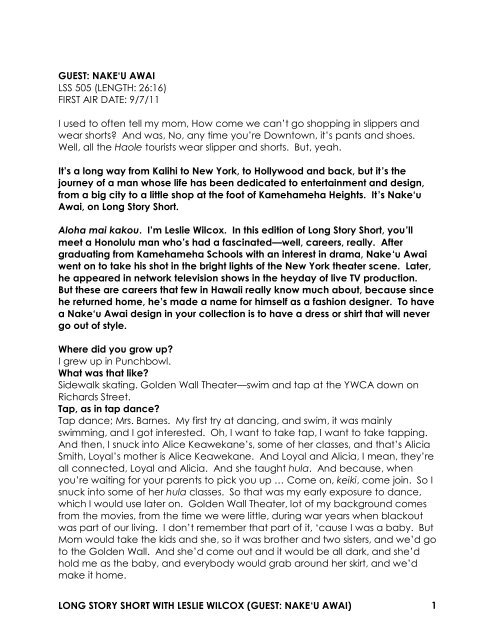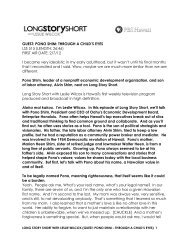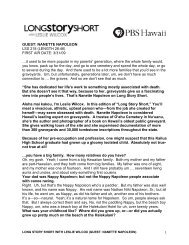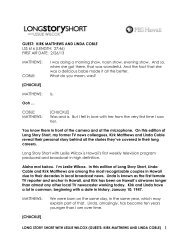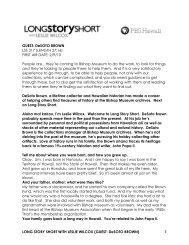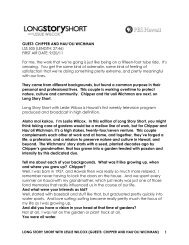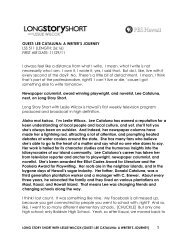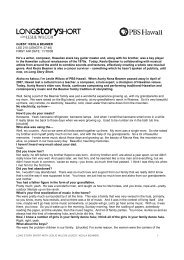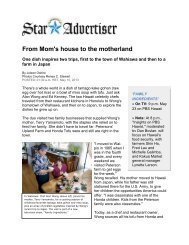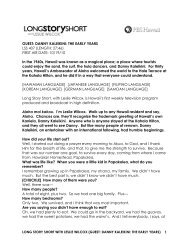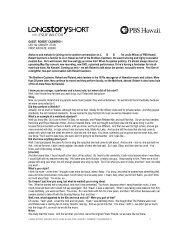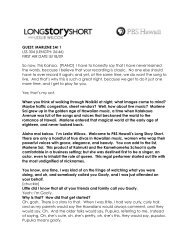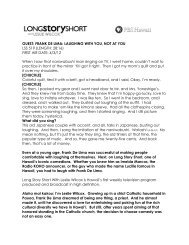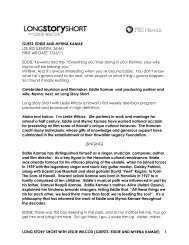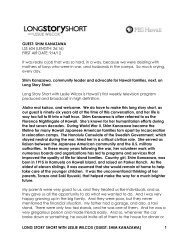guest: nake'u awai - PBS Hawaii
guest: nake'u awai - PBS Hawaii
guest: nake'u awai - PBS Hawaii
You also want an ePaper? Increase the reach of your titles
YUMPU automatically turns print PDFs into web optimized ePapers that Google loves.
GUEST: NAKE‘U AWAI<br />
LSS 505 (LENGTH: 26:16)<br />
FIRST AIR DATE: 9/7/11<br />
I used to often tell my mom, How come we can’t go shopping in slippers and<br />
wear shorts? And was, No, any time you’re Downtown, it’s pants and shoes.<br />
Well, all the Haole tourists wear slipper and shorts. But, yeah.<br />
It’s a long way from Kalihi to New York, to Hollywood and back, but it’s the<br />
journey of a man whose life has been dedicated to entertainment and design,<br />
from a big city to a little shop at the foot of Kamehameha Heights. It’s Nake‘u<br />
Awai, on Long Story Short.<br />
Aloha mai kakou. I’m Leslie Wilcox. In this edition of Long Story Short, you’ll<br />
meet a Honolulu man who’s had a fascinated—well, careers, really. After<br />
graduating from Kamehameha Schools with an interest in drama, Nake‘u Awai<br />
went on to take his shot in the bright lights of the New York theater scene. Later,<br />
he appeared in network television shows in the heyday of live TV production.<br />
But these are careers that few in H<strong>awai</strong>i really know much about, because since<br />
he returned home, he’s made a name for himself as a fashion designer. To have<br />
a Nake‘u Awai design in your collection is to have a dress or shirt that will never<br />
go out of style.<br />
Where did you grow up?<br />
I grew up in Punchbowl.<br />
What was that like?<br />
Sidewalk skating. Golden Wall Theater—swim and tap at the YWCA down on<br />
Richards Street.<br />
Tap, as in tap dance?<br />
Tap dance; Mrs. Barnes. My first try at dancing, and swim, it was mainly<br />
swimming, and I got interested. Oh, I want to take tap, I want to take tapping.<br />
And then, I snuck into Alice Keawekane’s, some of her classes, and that’s Alicia<br />
Smith, Loyal’s mother is Alice Keawekane. And Loyal and Alicia, I mean, they’re<br />
all connected, Loyal and Alicia. And she taught hula. And because, when<br />
you’re waiting for your parents to pick you up … Come on, keiki, come join. So I<br />
snuck into some of her hula classes. So that was my early exposure to dance,<br />
which I would use later on. Golden Wall Theater, lot of my background comes<br />
from the movies, from the time we were little, during war years when blackout<br />
was part of our living. I don’t remember that part of it, ‘cause I was a baby. But<br />
Mom would take the kids and she, so it was brother and two sisters, and we’d go<br />
to the Golden Wall. And she’d come out and it would be all dark, and she’d<br />
hold me as the baby, and everybody would grab around her skirt, and we’d<br />
make it home.<br />
LONG STORY SHORT WITH LESLIE WILCOX (GUEST: NAKE‘U AWAI) 1
And Golden Wall showed the latest Hollywood movies?<br />
All and one day, I thought maybe if I had enough money, I’d bring back<br />
Saturday matinees. It was where all the kids came. And ee screamed our<br />
hearts out, because it was all the Westerns, and they would have serial chapters<br />
where at the end, the guy would be falling off the cliff. Next week—<br />
[CHUCKLE]<br />
—follow through what happens. And when he fell off the cliff, he grabbed a<br />
branch, so he was saved, yeah.<br />
Do you remember how much it cost to go to those matinees?<br />
Nno.<br />
What did you have for snacks?<br />
I wasn’t too much of a snacker, but popcorn, I guess. And they had seed mui in<br />
bags, the paper bags. I mean, they dug it out like this, and that’s how you got<br />
it.<br />
Influenced by all those afternoons at the movies in the Golden Wall Theater in<br />
Nuuanu, Nakeu Awai began to see a future in art and design, eventually<br />
merging theater and fashion.<br />
But you’re a visual person, so movies—<br />
But this helped—<br />
—were preferable for you.<br />
Yeah. This helped me, yes. Yes. And then television came after that, from<br />
black and white into color. Yeah. So a lot of things that I create today because<br />
aside from fashions, it’s putting fashions into visuals that is I enjoy that more.<br />
More?<br />
More.<br />
So putting fashions into, say, musical revues?<br />
Yeah.<br />
And … shows.<br />
I enjoy—<br />
Fashion shows.<br />
I enjoy that. I enjoy that the most. And using other people’s—you know, so I will<br />
use my clothes as well as the other people and do shows. Because drama was<br />
what I majored in at University of Washington.<br />
So the shows are more important than the clothes that you have designed?<br />
I feel that. The segments that I do are universal emotions that we all experience.<br />
Have you thought of doing other than your fashion-related shows as musical<br />
revues?<br />
I’m open to, I’m always open to being creative. I’ve already started my<br />
Christmas show this year. I’m thinking about next year up at the Waikoloa. You<br />
know, Pili Pang’s haula in Waimea.<br />
LONG STORY SHORT WITH LESLIE WILCOX (GUEST: NAKE‘U AWAI) 2
So you’re that generation that sort of—you were before the H<strong>awai</strong>ian<br />
renaissance. You didn’t speak H<strong>awai</strong>ian.<br />
No. In fact, we grew up speaking only English.<br />
And Kamehameha insisted on it when you were a student there.<br />
And Kamehameha had a H<strong>awai</strong>ian language teacher. His name was<br />
Reverend Judd. But I felt so bad, and I guess I wasn’t strong enough to stand up<br />
against my peers. But it was after lunch, and the movie The Blue Angel, where<br />
the guy becomes taken advantage of, where he plays the dummy in the club,<br />
and all these horrible things happen to him. In the movie The Blue Angel, with<br />
Marlene Dietrich, yeah. So the same thing I thought about this man. See, so I<br />
relate back to when I saw this man. After lunch, kids brought straws back from<br />
the dining hall and was doing spitballs at him. And this old man was going, Oh,<br />
ooh.<br />
And he was the H<strong>awai</strong>ian teacher.<br />
Yeah, language. And so, did we learn the language?<br />
What did your parents do for a living?<br />
My dad was a land abstracter.<br />
What’s a land abstracter?<br />
Well, he worked at the Land Office, and it was reading land deeds and stuffs,<br />
and translating them. So on his own, he helped a lot of H<strong>awai</strong>ians find land that<br />
was due them, that they weren’t aware of. He’d ask them, Where were you<br />
born, who’s your parents? And he’d go do research kind of stuff. And my mom<br />
was an educator. And every weekend, my dad because see, we grew up<br />
without cars, because Mother and Dad never drove. We’d get on the taxi<br />
down at Aala Park. The kind that had all the extra seats, and go to Haleiwa<br />
because—<br />
Is that a jitney?<br />
Huh?<br />
Was that a jitney, with extra seats?<br />
Yeah. Yeah. Yeah, but it was called the Waialua Taxicab, and it drove you to<br />
your homes in Haleiwa, Waialua. And then it’d come back and pick you up.<br />
But we’d spend weekends there because he’d work up in the taro patch. Every<br />
weekend, he was in the loi, because—and by himself. And loi and kalo, as kalo<br />
people today will know, it’s hard work<br />
It’s very hard work.<br />
And you have to keep working at it. You can’t let it go by, because—<br />
So he worked five days a week, and then he goes to the taro patches—<br />
Yeah.<br />
—on the weekends?<br />
Yeah.<br />
That’s not a weekend. That’s not a break.<br />
LONG STORY SHORT WITH LESLIE WILCOX (GUEST: NAKE‘U AWAI) 3
But he enjoyed that. And he would bring back a bag of taro, and he would<br />
cook, we would have to peel.<br />
That’s what he did it for, a bag of taro?<br />
And he also sold. He started selling some of his kalo to Chun Hoon’s Market, the<br />
old market on Nuuanu. So we had fresh poi. It was lumpy. I preferred the<br />
factory poi, because it was smoother, but we’d peel. Oh, and I still have his<br />
boards somewhere in my shop, the poi boards that he used and pounded poi.<br />
Did you tell him his poi was too lumpy for you?<br />
No.<br />
[CHUCKLE]<br />
‘Cause he’d just strain it, yeah. And so, I mean, it was fine. It was fresh. But,<br />
after you get spoiled by having some factory made poi.<br />
What was your mom like?<br />
Mom was a hard worker. She believed in education, so she pushed all of us.<br />
After I graduated from Kamehameha School, I really wanted to get out and get<br />
into the working field. But, No, you gotta to go to college. So she pushed for<br />
that. Hard worker, a woman that wore the same pair of shoes until it kaputsed,<br />
then she got a new pair of shoes. So she gave up a lot. But then she wanted to<br />
see the world, so my first year after University of Washington, she wanted to see<br />
America. And Father hated traveling. So she ployed me into going, and so we<br />
saw America on Greyhound. From Seattle, we went straight across the northern<br />
route to visit friends and upstate New York, and then went down south, and<br />
came back across. Yeah.<br />
Was she still very frugal?<br />
Yeah. As she got older, because see, I was the last one. Everybody was—the<br />
two sisters were on their own, Brother was on his own, so maybe she felt a little<br />
more freer to do these trips. Because then she and Dad went to China, with<br />
Char’s Tours. I still remember that, because it was such a negative thing.<br />
After graduating from the University of Washington, and seeing North America by<br />
bus, it was time for graduate school. Catholic University in Washington, D.C. was<br />
a fine school; but for a young man from H<strong>awai</strong>i in the 1950s, D.C. was not quite<br />
the place to study theater. Where would Nake‘u Awai head next?<br />
So I told my parents. What are you going to do? I said, Live. Pause, pause.<br />
And they hung up on me, click. Next episode. So I moved to New York. But, I<br />
went all over New York. And when you’re young, you’re really kinda daring, so I<br />
looked up every conceivable rental. The nice thing about New York is they have<br />
rentals by price. So you can look for what you want to spend, and they’re right<br />
there. Well, I went Bowery, I went Harlem, I went all over New York. And after<br />
when I settled in New York, I said to myself, I would never, ever go back to all the<br />
areas that I went into. But one wintry morning, I was in Brooklyn Heights, and this<br />
woman in—you know, they have brownstones. She opened this tall black door.<br />
And she had a place, and it was within my price range, and it was a … so every<br />
LONG STORY SHORT WITH LESLIE WILCOX (GUEST: NAKE‘U AWAI) 4
time I watch TV, they have those steps going up into the brownstones, and to<br />
the side they have these two steps that go underneath. I was there. It went<br />
from sidewalk, all the way to the back of the house. It was long rental.<br />
And did you think you were gonna be a lifelong New Yorker at that point?<br />
I wanted to. Because New York will always be my happiest years.<br />
Why did you leave New York?<br />
Winter.<br />
[CHUCKLE] How many winters did you get through?<br />
Four. And the last winter, I had electric blankets. But when you’re sleeping, you<br />
go, [GRUNT]. Just slight turning. It was freezing. And I had moved, how you<br />
move around, you find a better place. So my last rental was on the fifth floor of<br />
this walkup. Wonderful. I wish I still did that. Overlooked the—you could see the<br />
Statue of Liberty, and the lower rivers before they split off the Hudson, and the<br />
Hudson and the other river, and subway and stuff, and stuff, and stuffs. Yeah,<br />
but New York, the energy, there’s no city that has the energy that keeps you,<br />
keeps you going.<br />
Did you feel your H<strong>awai</strong>ianess in New York?<br />
Yes. I have some pictures somewhere that we’ll see Rowena Akana and I, and<br />
this Filipino guy doing a H<strong>awai</strong>ian revue down in Atlantic City for Tutasi Wilson.<br />
She was a woman that lived in Florida, and would come up and do these big<br />
H<strong>awai</strong>ian conventions in Atlantic City. And that was the only time I did<br />
H<strong>awai</strong>ian. I never really studied H<strong>awai</strong>ian. There was a H<strong>awai</strong>ian restaurant<br />
that all the H<strong>awai</strong>ians gathered, but I quickly stayed away from it, because<br />
even back then in the 60s, the Alamihi Syndrome … H<strong>awai</strong>ians—<br />
Explain that.<br />
The alamihi is the black crab that goes crawling up, yeah? And as it gets up to<br />
the top, another one will come and grab and pull them both down. So, I didn’t<br />
want to be part of the Alamihi Syndrome.<br />
Definitely not. The ambitious Nake‘u Awai had a lot more that he wanted to do,<br />
and he kept on his path, a path which eventually led him back to Kalihi. But first,<br />
there would be a stop in Hollywood.<br />
I keep expecting that you’re gonna say, And then I became a costumer and a<br />
design person. But you’re not saying that.<br />
No.<br />
When did that come along?<br />
Not until my years in Hollywood. Because then, after the last winter, I came<br />
home, and got right into My Fair Lady with Linda Ryan. And the choreographer<br />
who came from Vegas saw that I had potential, so he pushed me to get the<br />
role of Carpathy the Hungarian. So besides being a dancer, I played a<br />
secondary part. And so I did that. While I was doing that, the people that I<br />
worked with in Atlantic City, Flower Drum Song, were being hired for this show in<br />
Reno. Direct from Japan, Hello Tokyo. We need another guy. Well, there’s Joel<br />
LONG STORY SHORT WITH LESLIE WILCOX (GUEST: NAKE‘U AWAI) 5
Awai, he lives in Honolulu. So they called me. I got hired to go up to Reno. And<br />
the three male singer dancers were myself, Jimmy Borges, and Bob Ito. Now,<br />
Bob Ito … Quincy. Remember that show? It was where he was the mortician.<br />
Right.<br />
His assistant was this very well spoken Japanese guy, Bob Ito.<br />
I remember him. Okay, that’s Bob Ito.<br />
And he spoke so well. See, Bob Ito is a Canadian, so of course, he will speak<br />
very well.<br />
And that’s where you met Jimmy Borges?<br />
And that’s where I met Jimmy Borges.<br />
What was he like then?<br />
Well, like all the dancers, they make fun of the singer’s walk, Jimmy.<br />
[CHUCKLE]<br />
In other words, the same leg and the same arm swing. Instead of opposition,<br />
yeah? That’s the natural walk. They walk da, da, da, da. Yeah.<br />
So he was definitely a singer, the way he walked.<br />
Yeah, but the three of us had to do singing and dancing. I stayed in West<br />
Hollywood until I found my own place. Then I started going to auditions, and I<br />
started dancing on television. So that is the next nine years of my life.<br />
Nine years dancing on television and other venues. What kind of dancing did<br />
you do?<br />
Jazz; modern dance. Back then, musical specials were big, so I performed like<br />
the Jack Benny Special, or the Petula Clark Special, or Elvis had a special I was a<br />
part of.<br />
Now, you said you weren’t an extraordinary dancer, but it sounds like you’re<br />
getting some good roles. You’re getting hired.<br />
Well, so maybe I was better than some of the others. But I mean, I don’t<br />
consider myself a solo dancer, because I worked with a number of people who<br />
were great solo dancers, like in the Elvis Presley Special.<br />
So what was it like? Did you actually encounter Elvis? You saw him on the set?<br />
Well, Elvis was a very quiet, timid fellow who was like a school kid. And when he<br />
tried to relax and socialize, the moment Colonel Parker came in Elvis.<br />
How old was Elvis then? Was he out of the Army?<br />
He was out of the Army, yeah. I don’t know. Because this was in preparation for<br />
him to go to—because Elvis performed, then he went to movies, then he went<br />
into the Army. Now he’s out of the Army, and he’s gearing to go back to—<br />
because then he made a big—after television special, he went to Vegas, yeah?<br />
I think Elvis and I would be about the same age. I don’t remember. Do you<br />
know how old he is, or would be?<br />
No, I don’t know how old he would be.<br />
Okay.<br />
So did you have any interaction with him?<br />
No. No. Because he didn’t socialize with us, because he was under wraps, or<br />
when he did come in and the Colonel would come in, he would jump up and<br />
LONG STORY SHORT WITH LESLIE WILCOX (GUEST: NAKE‘U AWAI) 6
he would disappear. Yeah; so dancers, they’re like cattle. They’re just kept in<br />
some room until they need them. And the thing with television, which is really<br />
junk, is you don’t have time to really warm up. So we call it the warm up special.<br />
We’d come to work, go get our face done. So you go to make up, get your<br />
face done, then we greased up our bodies with um, Bengay. Because then—<br />
You didn’t want to hurt. [CHUCKLE]<br />
Yeah. No, because then when you got up to dance, you would be all warmed<br />
up. Because Bengay would get your muscles and bones ready for performing.<br />
Because you never knew; sometimes you would wait hours before they’d call<br />
you. Dancers! So like when these musicals started to dwindle, the first people<br />
they got rid of were the dancers. The second people they got rid of were the<br />
singers. The last people they got rid of were the actors. That pecking order;<br />
yeah. So I worked with a lot of big names. Bill Cosby was one, his special. I<br />
came back to do Don Ho’s special, because the dancers were hired in LA, and<br />
so we came back when he did his special. And I still remember getting flown, a<br />
few of us getting flown to Lahaina to work with the children at the elementary<br />
school there, where they did this One Paddle, Two Paddle, walking down Front<br />
Street. And we were like guides, yeah, or aides or guides, I mean, as dancers.<br />
So that was Do Ho’s special.<br />
It was in Lahaina, during the shooting of a Don Ho television special, that the<br />
germ of the idea of a career in fashion design finally took hold in Nake‘u Awai.<br />
Remember those photos of jumpsuit Elvis, macramé’d beaded belt flying? That<br />
was his handiwork.<br />
While I was there, I was fortunate to have a close friend from Japan teach us<br />
how to do macramé. And because all Japanese children grow up learning<br />
knots, what the sailors do, the art of knotting. And so he taught us how to do<br />
macramé. And so this other fellow from H<strong>awai</strong>i and I decided to go into<br />
business doing macramé belts. This was before the hippies then got hemp and<br />
were doing macramé baskets, macramé wall hanging and stuffs. We did belts<br />
and accessories. So I sold these belts to stores in Beverly Hills, to fur shops in<br />
Beverly Hills, to designers like Bob Mackey, where I still have some drawings.<br />
‘Cause Bob Mackey was a good artist, and that’s how he started before he got<br />
into fashions. He was an artist who drew for designers. And so, he gave me<br />
some sketches of macramé that we did for Carol Burnett and stuffs and stuffs,<br />
where we did the macramé, and he did these sketches. Because he could<br />
make the drawing look like Carol Burnett. And so I got to meet designers<br />
besides he, Jean Louis, which is the old film that Lana Turner did, her gowns by<br />
Jean Louis. Jean Louis, who was a French designer who also, for a long time, did<br />
the uniforms for United Airlines, long ago. Well, he had a factory in Beverly Hills.<br />
And what’s interesting, half of his factory were Japanese, and the other half of<br />
his factory were Haole. And you could tell the difference, because the<br />
Japanese factory was zz, zz, zz. The Haole factory, [GIBBERISH]. So, I became<br />
LONG STORY SHORT WITH LESLIE WILCOX (GUEST: NAKE‘U AWAI) 7
aware of clothing design there. My Black choreographer mentor, Claude<br />
Thompson, felt that I could do it. So he gave me this job where I was doing<br />
costumes for Sammy Davis’ girls, because Claude was choreographing them.<br />
And he wanted me to do the costumes, so I was given this wonderful budget to<br />
do costumes for six girls. And that was my first try at clothing.<br />
What did you do for them? What kind of costumes did you come up with?<br />
I had fun. I was very creative. I went downtown LA and found all these places<br />
like where you could buy leather. And I bought chamois. The stuff you clean<br />
cars with? I bought skeins of chamois and cut them into—left parts of it rough,<br />
because the edges of chamois uncut, and did a wrap blouse for them, and<br />
sewed and hung beads on them. And then I got scarves that they did what the<br />
Blacks do, a do-wrap, the tight um, head wrap with a knot here, and bought a<br />
whole bunch of scarves, and did a scarf skirt. So I asked friends of mine, Well, if I<br />
want a scarf skirt, how do you do it? Well, you hang the scarf point-to-point, you<br />
sew from point to this point, from point to that point. And so, as long as I knew<br />
the construction, then I could pass it on to a seamstress. So they had these scarf<br />
skirts. So when they stood … would be all scarves hanging, but when they spun,<br />
it didn’t split apart, it connected. And with that, I had these big clunky boots.<br />
And it worked.<br />
Yeah. He loved it, and Sammy loved it too. So on a couple of times, I met<br />
Sammy and his wife Altovise, who was one of his dancers that he ended up<br />
marrying, and Sammy’s little black poodle, who I hated, because he’d run<br />
down from the house, and he’d straddle your foot, and shee all over you.<br />
[CHUCKLE]<br />
And I’d go … [GAGGING]. [CHUCKLE]<br />
When you look at your career, and you’re still going, how do you describe it?<br />
Well, it’s something that I look forward to every morning. It’s not like I don’t want<br />
to go to work. I get ready, I get up at five-fifteen, I do my things.<br />
What’s in your shop? Tell us about your shop.<br />
My shop is a collection of my fashions, and a collection of things that I like, and<br />
have cluttered my shop with. Like I have these blown-out Portuguese man-owar<br />
[CHUCKLE] that Colleen Kimura did. So it’s like this blue spacey thing, and it<br />
has all the tendrils hanging down. And I have an old wreath that Noelani<br />
Pomroy did when she came from Kauai. I have an old, old, old, old wreath that<br />
Amelia Bailey brought to the shop many years ago, that’s still hanging up there.<br />
So it’s like going in a Chinese shop full of all kinds of—I mean, people come in,<br />
and they’re like [CHUCKLE]—the look is … Or they’ll come in, and they’ll take a<br />
long time, because there are too many textures and colors, and blends, and<br />
things to look at. I mean, yeah. And I like it. Everybody says, You need a bigger<br />
shop. No, I’ve gotten used to it.<br />
At the time of this conversation in the summer of 2011, Nake‘u Awai continues to<br />
create and design, an icon of H<strong>awai</strong>ian fashion. From his overflowing shop in<br />
Kalihi, he continues the dance of life, inspiring a new generation with his timeless<br />
LONG STORY SHORT WITH LESLIE WILCOX (GUEST: NAKE‘U AWAI) 8
textiles. For Long Story Short, and <strong>PBS</strong> H<strong>awai</strong>i, I’m Leslie Wilcox. A hui hou<br />
kakou.<br />
For audio and written transcripts of this program, and all episodes of Long Story<br />
Short with Leslie Wilcox, visit pbsh<strong>awai</strong>i.org.<br />
When you see Elvis and he has these gyrating hips with these belts with beads<br />
on them, those were the belts that we did for Bill Ballou was the designer. A lot<br />
of things, as I look back, I’ve done stuffs that people didn’t understand what I<br />
did, and why I was doing it until later, and then you see them doing it and<br />
understanding it.<br />
LONG STORY SHORT WITH LESLIE WILCOX (GUEST: NAKE‘U AWAI) 9


